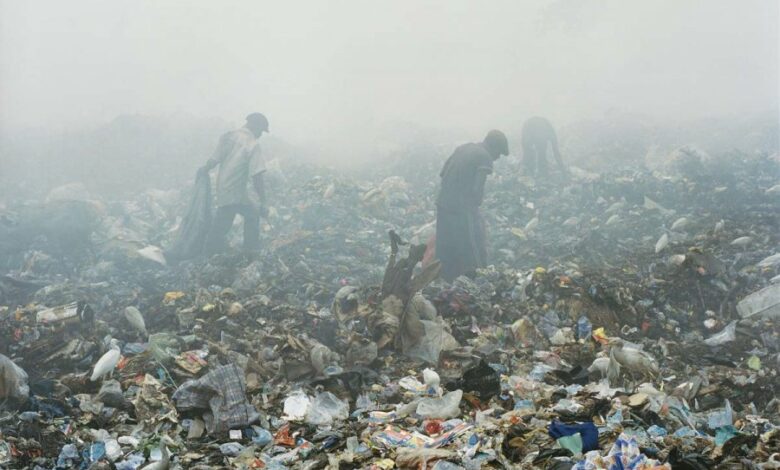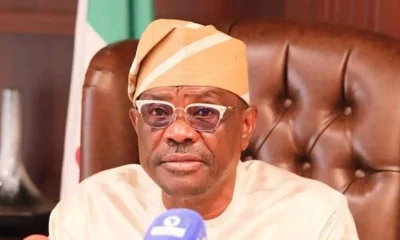News
Lagos Tops Global Plastic Pollution Rankings, Study Reveals

A recent study published in the journal *Nature* by the University of Leeds has identified Lagos, Nigeria, as the leading city in global plastic pollution. This finding highlights Lagos’s significant contribution to the estimated 57 million tonnes of plastic waste generated worldwide each year.
The study reveals that over two-thirds of global plastic pollution originates from the Global South. Annually, approximately 52 million metric tonnes of plastic waste could fill New York City’s Central Park to the height of the Empire State Building. Researchers analyzed data from over 50,000 cities and towns, focusing on plastic waste that ends up in the environment rather than in landfills or incinerators.
Lagos is at the top of the list of major plastic polluters, followed by New Delhi, Luanda in Angola, Karachi in Pakistan, and Cairo in Egypt. India is the largest contributor to global plastic pollution, producing 10.2 million tonnes annually, more than double Nigeria’s output, which is the second highest. Indonesia follows, while China, though heavily criticized for pollution, ranks fourth but has made notable progress in waste reduction. Other significant contributors include Pakistan, Bangladesh, Russia, and Brazil, with these eight countries responsible for over half of the world’s plastic pollution.
The study indicates that 15% of the global population lives in regions where local governments fail to collect and properly dispose of waste, exacerbating plastic pollution in areas like Southeast Asia and Sub-Saharan Africa. This deficiency in waste management infrastructure is a major factor driving the high pollution levels.
In response to this crisis, nations agreed in 2022 to develop the first legally binding treaty on plastic pollution, including marine waste. Final negotiations for this treaty are set for November in South Korea.
The research utilized artificial intelligence to examine plastics that are either improperly burned or dumped, constituting about 57% of the pollution. These processes release microplastics and nanoplastics, which pose serious health risks. Study author Costas Velis noted that microplastics are now pervasive, found in remote locations like Everest’s peaks and the Mariana Trench, as well as in the air, water, and food.
Velis cautioned against attributing the problem solely to the Global South, highlighting that the issue stems from a lack of resources and inadequate waste management systems. Some experts argue that focusing on pollution rather than production may overshadow the broader issue of plastic manufacturing, which significantly contributes to greenhouse gas emissions. Others point out concerns about the trade in plastic waste, noting that while the study shows a decline in this trade, there has been a recent increase in trash shipments from Europe to developing nations.
The plastics industry acknowledged the study’s findings. Chris Jahn, secretary of the International Council on Chemical Associations, emphasized the need for improved waste management systems. However, the industry remains opposed to limiting plastic production, despite UN warnings that global plastic production could triple by 2050.
News
TCN Acknowledges 7th Grid Collapse in 2024

The Transmission Company of Nigeria (TCN) has reported its seventh partial grid collapse in 2024. Despite the recurring issue, TCN’s General Manager of Public Affairs, Ndidi Mbah, reassured the public that efforts to restore power are well underway, with about 90% of substations receiving bulk power.
Mbah noted that the Azura Power Station initiated the grid recovery, although a minor setback occurred. However, power supply has been restored to the Abuja region and other key distribution centers. The Ibom Gas Generating Station remained unaffected, continuing to supply power to the South-South region.
An investigation into the cause of the collapse will commence once full grid restoration is achieved.
News
Jigawa Tanker Tragedy: Shettima, First Lady Mourn Victims, Pledge Federal Support

Vice President Kashim Shettima has expressed deep sorrow over the tragic tanker explosion in Jigawa State, which claimed over 100 lives. In a statement issued by his media aide, Stanley Nkwocha, Shettima, on behalf of President Bola Tinubu, extended condolences to the affected families, praying for strength and comfort in their time of grief.
Shettima assured the public that the federal government is mobilizing resources to support the injured and assist those affected. He has directed the immediate deployment of the National Emergency Management Agency (NEMA) to provide aid. The Vice President also stressed the need for a review of fuel transportation safety protocols to prevent future incidents.
In a separate statement, First Lady Oluremi Tinubu offered her condolences to Jigawa Governor Umar Namadi and the people of Jigawa, praying for peace and comfort for the families affected. She called the incident “unfortunate” and extended prayers for the recovery of the injured and the repose of the souls lost in the tragedy.
News
Nigeria Customs Intercepts Arms, Ammunition Worth N9.5bn Over Six Years

The Nigeria Customs Service (NCS) has revealed that it intercepted a total of 10,598 pieces of arms and 114,929 rounds of ammunition valued at N9.58 billion over the past six years. Comptroller General of Customs, Bashir Adewale Adeniyi, made this disclosure during a press conference on enforcement activities in Zone A.
Adeniyi highlighted that 60% of these seizures occurred in 2023, reflecting the Customs’ increased efforts to curb arms smuggling. He also mentioned that recent operations such as Operation Whirlwind and Operation Swift Sting are part of a strategic response to tackle evolving smuggling tactics.
In addition to arms seizures, the Customs CG announced the largest pangolin scale seizure since 2020, with 9,493 kg of scales confiscated in collaboration with the Wildlife Justice Commission. The joint operation led to four arrests across Kano, Kaduna, and Lagos. The NCS continues to intensify efforts against wildlife trafficking, targeting supply routes in northern Nigeria and border areas.
-

 Business21 hours ago
Business21 hours agoOkpella Monarch: Obaseki Ratified Kingmakers Decision, End 5years leadership Vacuum
-

 Banking17 hours ago
Banking17 hours agoFree Food Saga: Akpabio quoted out of context-CSO
-

 Foreign22 hours ago
Foreign22 hours agoSci-tech innovation fuels China’s high-quality development
-

 Entertainment14 hours ago
Entertainment14 hours agoDavido Declares ‘Timeless’ His Best Album
-

 Entertainment14 hours ago
Entertainment14 hours ago‘Adire’ Secures Four Nominations at the Best of Nollywood Awards
-

 Business14 hours ago
Business14 hours agoWike Urges Nigerians to Pay Taxes for Improved Social Services
-

 Sports14 hours ago
Sports14 hours agoMessi Matches Ronaldo’s Record with Hat-Trick Against Bolivia
-

 Foreign16 hours ago
Foreign16 hours agoQinling Mountains better safeguarded with comprehensive digital platform






